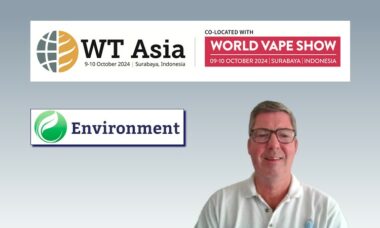 The global tobacco industry is shifting towards making more sustainable cigarette filters, according to an industry stakeholder. Innovation with filters of the kind currently being developed for combustibles may soon find its way into heated tobacco products as well, driven by a European directive that could potentially ban single-use filters in its next revision.
The global tobacco industry is shifting towards making more sustainable cigarette filters, according to an industry stakeholder. Innovation with filters of the kind currently being developed for combustibles may soon find its way into heated tobacco products as well, driven by a European directive that could potentially ban single-use filters in its next revision.
Concerns have been raised about the current use of cellulose-acetate-based filters in traditional cigarette butts. These filters contain polymerised cellulose, which acts like a plastic in that it is not easily biodegradable. Instead, cigarette butts degrade into microplastics that remain in the environment for long periods of time, causing a significant threat to public health and the environment.
Peter Gawley (pictured), director at non-woven materials producer McAirlaid’s – which makes more sustainable cigarette filters – told TobaccoIntelligence that the industry’s awareness of the issue had been raised by the EU’s Single-Use Plastics Directive (SUP), which came into force on 3rd July 2021.
With the goal of reducing waste and limiting the impact of plastic on the environment, the directive banned some single-use plastic products, for which alternatives could easily be used. It also highlighted the fact that tobacco filters are the second most found single-use plastic item on beaches in the EU.
The directive applies to “tobacco products with filters” and TobaccoIntelligence interprets this to mean that heated tobacco filters fall within its scope. Therefore, manufacturers and importers of heated tobacco consumables in EU member states that have transposed its rules – which include the extended responsibility of producers – must comply with the directive if their products contain anything that could be regarded as a filter.
While the SUP Directive does not currently ban cellulose acetate-based filters, a revision is planned for July 2027, which includes reassessing its list of banned products.
Asia looking towards Europe
“Five years ago there was no interest in this issue in Asia but now everyone in the tobacco industry is looking at the lead the EU has taken,” Gawley told TobaccoIntelligence. “We have lots of partners in Asia and the level of interest there is surprisingly high and growing.”
“The annual reports of the big four western tobacco producers all say they’re developing solutions to meet their sustainability targets”, he added. “Let’s see where that takes them.”
McAirlaid’s has developed a material for making alternative cigarette filters from non-woven cellulose that has not been polymerised and is therefore said to biodegrade within weeks. Gawley said the company’s products are already being used on cigarette brands on the market in Europe, and he expects them to become used in commercial products available in Asia within the next two years.
“Traditional cigarette filters are not actually made from plastic but from polymerised cellulose, which behaves like a plastic – which is why it doesn’t biodegrade. Our materials have been widely accepted as a good alternative to acetate and are just as effective as a filtration system.”
To develop the material, McAirlaid’s devised a production process similar to the one used for paper making but employing air instead of water. The cellulose fibres are pressed and consolidated into a roll format using high pressure. The roll can then be processed into cigarette filters. For every tree felled to source cellulose for McAirlaid product, a further three are planted in sustainable forests, according to Gawley.
The company’s engineers developed a packaging system that enables the material to be delivered to manufacturers in bales, which is a similar format to cellulose acetate. This enables the production process to stay efficient without existing machinery having to be replaced.
Large-scale production
“The cigarette industry consumes hundreds of thousands of tonnes of cellulose acetate product each year,” said Gawley. “Any alternative to this has to be able to offer similar large-volume availability to scale up to production levels easily. You can have the best material in the world but if you can’t supply it at scale it won’t work.”
McAirlaid’s has worked with machine builders to develop new machinery that can process its air-laid nonwovens effectively and has also developed kits that can be retrofitted to existing machinery to minimise the expenditure required to upgrade equipment.
“We’ve been talking with cigarette producers for years about the pros and cons of using more sustainable materials. There’s no point in having that conversation if the material required to produce at scale isn’t available,” said Gawley.
Consumer experience
The consumer has to be considered as much as the cigarette producer. McAirlaid’s has been testing the functionality of its more sustainable filters in cigarettes to ensure the resulting smoking experience offers consumers the same level of mouthfeel and filtration as its cellulose acetate counterpart. Sustainability can’t come at the price of the consumer experience.
“The filter has to be developed in a way that consumers would accept” said Gawley. “For example, for an air-laid filter to be successful it may need to have a lower pressure drop than the acetate version so that it’s as easy to puff.”
In terms of how that impact inhalation, he explained there’s a lot more to smoking a cigarette than inhaling smoke: “You need to consider the haptics in the fingers, mouthfeel in the throat, and so on. Our customers have conducted consumer tests and reported results that have been extremely positive.”
Peter Gawley will be speaking on behalf of McAirlaid’s about ‘The evolution of materials for sustainable and plastic-free cigarette filters’ at the World Vape Show Indonesia, this year co-located with World Tobacco Asia, from 9th to 10th October.
– TobaccoIntelligence staff







